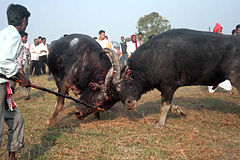Magh Bihu
| Magh Bihu | |
|---|---|
 A Buffalo fight held at Ranthali, in Nagaon District of Assam, on the occasion of Magh bihu | |
| Type | Seasonal, Traditional |
| Significance | Festival of Harvesting crops |
| Date | Makar Sankranti |
Magh Bihu (মাঘ বিহু) (also called Bhogali Bihu (ভোগালী বিহু) (Bihu of eating foods and enjoyment) or Maghar Domahi (মাঘৰ দোমাহী) is a harvest festival celebrated in Assam, India, which marks the end of harvesting season in the month of Maagha (January–February).[2] It is the Assam celebration of Makar Sankranti, with feasting lasting for a week.[3]
The festival is marked by feasts and bonfires.[4] Young people erect makeshift huts, known as Meji and Bhelaghar, from bamboo, leaves and thatch, and in Bhelaghar they eat the food prepared for the feast, and then burn the huts the next morning.[5] The celebrations also feature traditional Assamese games such as tekeli bhonga (pot-breaking) and buffalo fighting.[6] Magh Bihu celebrations start on the last day of the previous month, the month of "Pooh", usually the 29th of Pooh and usually the 14th of January, and is the only day of Magh Bihu in modern times (earlier, the festival would last for the whole month of Magh, and so the name Magh Bihu).[7] The night before is "Uruka" (28th of Pooh), when people gather around a bonfire, cook dinner, and make merry.
During Magh Bihu people of Assam make cakes of rice with various names such as Shunga Pitha, Til Pitha etc. and some other sweets of coconut called Laru.
The 2016 date for this observance is January 16.
References
- ^ "2017 Marathi Calendar Panchang". Retrieved 6 October 2016.
- ^ "Celebrating Nature's Bounty - Magh Bihu". EF News International. Retrieved Jan 14, 2012.
- ^ Sharma, S. P.; Seema Gupta (2006). Fairs & Festivals Of India. Pustak Mahal. p. 25. ISBN 978-81-223-0951-5.
- ^ The New Encyclopædia Britannica. Vol. 21. Encyclopædia Britannica. 1987. p. 137. ISBN 978-0-85229-571-7.
- ^ "Bihu being celebrated with joy across Assam". The Hindu. January 14, 2005. Retrieved 2009-05-02.
- ^ "Bonfire, feast & lots more - Jorhat celebrations promise traditional joy this Magh Bihu". The Telegraph. January 12, 2008. Retrieved 2009-05-02.
- ^ |url= http://www.markinkalpataru.org/MK/assamese_date/assamese_cal.php |
